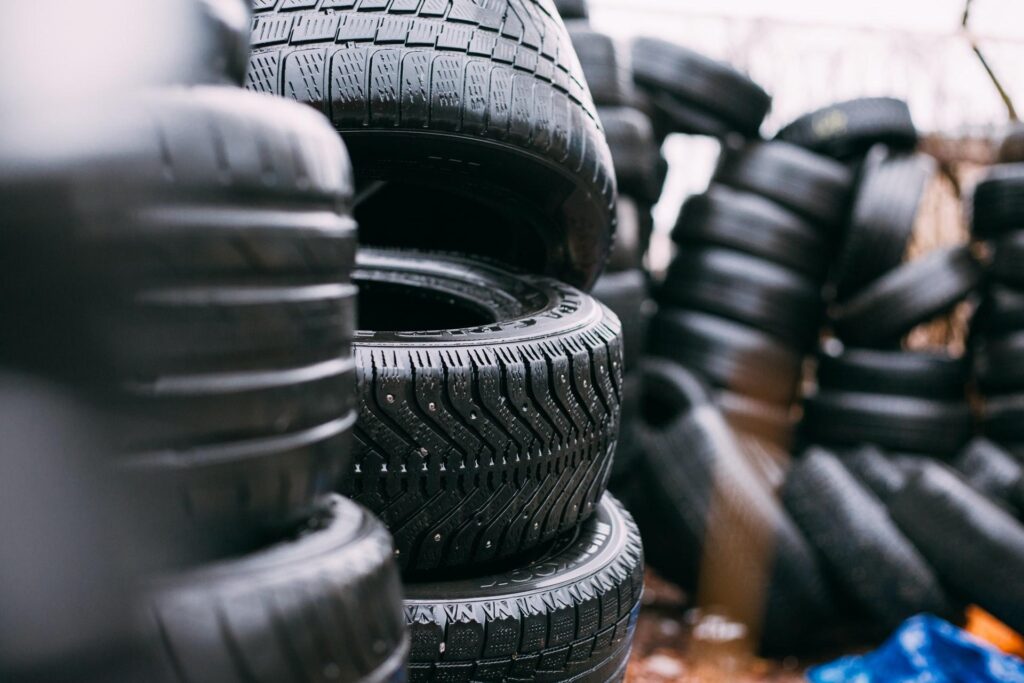Optimizing Four Key Elements for Your Car
Tires make the direct connection between your car and the road. They contribute to many aspects of the driving experience, including safety and fuel efficiency.
The state of your tires can also factor into your car insurance rates. You’ll want to read to the end as we address whether insurance covers flat tires, or if a new set of tires will affect your car insurance premiums.
First, let’s examine how tires affect safety because safety should always come first.

Tires and Safety
Your tires will affect your stopping distance, your ability to maintain control and the comfort of your ride. Choosing the right tire for your climate can be an essential part of your overall safety while driving.
Winter weather can beat up all vehicles, especially electric ones, but frigid weather affects more than your vehicle’s engine or battery pack. It can also make your tire’s rubber harder and hard to handle in icy conditions. That’s why using a four-season tire or switching out your regular tires for winter tires is an essential safety precaution for cold-weather regions.
There are several ways you can care for your tires to ensure maximum safety no matter which kind you have.
Proper Inflation
Keeping your tires properly inflated will help them wear the way they were designed to. If you always ride on low tires, the outer edges of the tread will wear more quickly, and the tires will be more likely to blow while you’re traveling down the road or highway.
Besides being at greater risk of deflation, tires won’t last as long if they’re not inflated to manufacturer specifications.
Rotate Your Tires Regularly
You should have your tires rotated every 5,000 miles or so. Tires in the front of a front-wheel drive vehicle tend to wear more quickly than tires in the rear because of the torque involved with acceleration. The opposite is true for rear-wheel drive cars.
When tires on a car wear evenly, they’ll handle more smoothly and safely. As well, a set of tires will last longer when they’re rotated routinely.
Tire Inspection
Frequent inspection of your tires will alert you to potential problems before they cause a dangerous situation. For example, you may find a nail or screw that needs to be removed and patched before getting a flat.
You should also inspect your tire’s tread. An easy and convenient way to measure tread depth is to use a penny. Position the penny so that the edge closest to Lincoln’s head touches your tire inside the treads. If you can see the top of Lincoln’s head, it’s time for new tires. You should check each tire’s tread in several places.
You should check your tire’s tread about once a month and before every major road trip.
Safety isn’t the only reason for proper tire care; fuel efficiency is another benefit.
Tires and Fuel Efficiency
There are several factors involved in tires and fuel efficiency, and we’ll look at a couple of them.
Tire Pressure
The tire pressure in your vehicle affects the resistance between your car and the road. The more resistance you have, the lower your fuel economy will be. The sweet spot for fuel economy and tire pressure will be what the manufacturer recommends for your car’s tires.
If you have a tire pressure sensor in each tire, you may think you can skip checking your tires, but you’re not off the hook so easily. The tire pressure monitoring system (TPMS) will let you know if your tires are dangerously low most of the time, but sometimes a sensor goes bad.
Also, the TPMS won’t alert you until your pressure drops below a threshold. Your tires might be a few pounds of pressure low, which could negatively affect your fuel consumption, but your TPMS won’t be activated.
You can check your tire pressure with a simple tire gauge.
Tread
The smoother your tire, the lower its resistance, and the better fuel mileage you’ll have. There’s an associated con with every pro, and the issue with smooth tires is that they don’t move water, so you’ll could hydroplane after a drizzle.
Since that safety issue is serious, you won’t find smooth tires at your local tire shop for regular vehicles.
You can be safe, though, and still choose a more fuel-efficient tire. Ask your tire specialist for their recommendation. Aggressive tread may be suitable for off-road driving, but it’s not best for highway driving and fuel consumption.

Tires and Insurance Savings
If you were hoping that the cost of new tires would be offset by the insurance savings new tires will give you, you’re going to be disappointed.
Getting new tires won’t directly affect your insurance premiums, but your tire care will affect your insurance rates indirectly.
Indirect Insurance Savings
Since good tire care makes your driving experience safer, you may avoid an accident that increases your insurance premiums.
Insurance rates are based on the risk that you present to an insurance company. If you’re in an accident, insurance companies typically charge you higher insurance rates for several years after the incident.
If you can avoid an accident, you can avoid higher insurance premiums. Thus, proper tire care can save you money on insurance premiums.
Tire Problems and Insurance
If you have a problem with your tires, you may hope that your insurance provider will help you repair or replace them. Most of the time, though, insurance won’t cover tire repair or replacement.
Even if they did, it’s usually not worth making a claim. For example, if you hit a huge pothole at 50 mph, your tire may get slashed by the edge of the hole. You won’t reach that threshold if you have a $500 deductible for collision coverage because replacing one tire typically costs less than $500.
There would be no point in filing an insurance claim because there would be no benefit. However, if the pothole broke your axle and damaged your shocks, it may be worth filing a claim.
Roadside Assistance
There is one common way that insurance will help you with a flat tire, and that’s through roadside assistance coverage.
If you have roadside assistance on your policy, you can call your insurer, and they’ll cover the cost of someone coming out and putting on your spare or towing you to a tire shop.
Caring for your tires will help you avoid unnecessary flats and potentially damaging situations. Additionally, tire maintenance will yield the benefits of fuel savings and indirect insurance savings.
Story by Melanie Musson.
Melanie Musson writes and researches for the car insurance comparison site, CarInsurance101.com. She strives to help people learn how they can improve their safety on the road and maximize their insurance savings.
